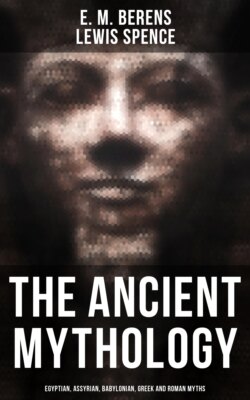Читать книгу The Ancient Mythology: Egyptian, Assyrian, Babylonian, Greek and Roman Myths - Lewis Spence - Страница 81
На сайте Литреса книга снята с продажи.
Gilgamesh meets Eabani
ОглавлениеThe feast of Ishtar was in progress when they reached Erech. Eabani had conceived the idea that he must do battle with Gilgamesh before he could claim that hero as a friend, but being warned (whether in a dream, or by Ukhut, is not clear) that Gilgamesh was stronger than he, and withal a favourite of the gods, he wisely refrained from combat. Meanwhile Gilgamesh also had dreamed a dream, which, interpreted by his mother, Rimat-belit, foretold the coming of Eabani. That part of the poem which deals with the meeting of Gilgamesh and Eabani is unfortunately no longer extant, but from the fragments which take up the broken narrative we gather that they met and became friends.
The portions of the epic next in order appear to belong to the IInd tablet. In these we find Eabani lamenting the loss of his former freedom and showering maledictions on the temple-maiden who has lured him thither. However, Shamash, the sun-god, intervenes (perhaps in another dream or vision; these play a prominent part in the narrative), and showing him the benefits he has derived from his sojourn in the haunts of civilization, endeavours with various promises and inducements to make him stay in Erech—"Now Gilgamesh, thy friend and brother, shall give thee a great couch to sleep on, shall give thee a couch carefully prepared, shall give thee a seat at his left hand, and the kings of the earth shall kiss thy feet." With this, apparently, Eabani is satisfied. He ceases to bewail his position at Erech and accepts his destiny with calmness. In the remaining fragments of the tablet we find him concerned about another dream or vision; and before this portion of the epic closes the heroes have planned an expedition against the monster Khumbaba, guardian of the abode of the goddess Irnina (a form of Ishtar), in the Forest of Cedars.
In the very mutilated IIIrd tablet the two heroes go to consult the priestess Rimat-belit, the mother of Gilgamesh, and through her they ask protection from Shamash in the forthcoming expedition. The old priestess advises her son and his friend how to proceed, and after they have gone we see her alone in the temple, her hands raised to the sun-god, invoking his blessing on Gilgamesh: "Why hast thou troubled the heart of my son Gilgamesh? Thou hast laid thy hand upon him, and he goeth away, on a far journey to the dwelling of Khumbaba; he entereth into a combat (whose issue) he knoweth not; he followeth a road unknown to him. Till he arrive and till he return, till he reach the Forest of Cedars, till he hath slain the terrible Khumbaba and rid the land of all the evil that thou hatest, till the day of his return—let Aya, thy betrothed, thy splendour, recall him to thee." With this dignified and beautiful appeal the tablet comes to an end.
